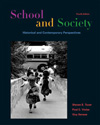 |  School and Society: Historical and Contemporary Perspectives, 4/e Stephen E. Tozer,
The University of Illinois, Chicago
Paul C. Violas
Guy Senese,
Northern Arizona University
Diversity and Equity Today: Defining the Challenge
Professional Vocabulary- cultural deprivation studies
- Sociological studies conducted in the 1960s that appeared to prove that the source of low-income and minority children's relative lack of success in public schools was insufficient cultural and linguistic stimuli at home, dooming to failure efforts to teach such children in schools.
- Education for All Handicapped Children Act
- Passed by Congress in 1975 as Bill 94-142; required school districts to educate special education students in the "least restrictive environment" possible so that they would be educated as much as possible with the general population of students, with accommodations made to support the learning of the special needs students.
- equality
- Sameness of treatment or condition, as distinct from equity, which emphasizes fairness of treatment or condition.
- equity
- Fairness of treatment or condition among two parties; does not entail equality of treatment or condition; sometimes requires differential treatment.
- ethnicity
- A person's cultural inheritance, including language, values, customs, beliefs, and usually cultural identity.
- glass ceiling for women
- An invisible barrier in the workplace and government above which it is supposedly difficult for women to rise; explains the very low percentage, for example, of women in CEO positions in Fortune 500 companies and of women in the U.S. Senate.
- GI Bill
- Act of Congress passed after World War II that allowed military veterans to attend colleges and universities at government expense.
- Hispanic versus Latino
- Terms debated among the descendants of Spanish-speaking Americans because each of these identity names has its own history and political significance and because different Americans identify more with one of those political histories than with the other; similarly, some Americans of Mexican descent prefer the designation Chicano to either Hispanic or Latino.
- meritocracy
- A term for the view popularized by Jefferson, Conant, and others in different times and places that a society's institutions should be led by those who merit it by their talent and character.
- model minority
- A term wrongly applied to Asian-Americans to show that Asian-American immigrant groups have adjusted successfully to U.S. mainstream culture.
- race
- A term used to identify supposedly biological differences among human beings; does not stand up to scientific scrutiny based on biology; based more on social perceptions of human difference and often used to sustain and justify unequal power relations among cultural groups.
- racism
- The practice of treating people unequally and inequitably because of their membership in an ethnic group.
- sex role socialization
- The shaping of beliefs, values, and behaviors in accordance with gendered social expectations about differences between the sexes.
- sex versus gender
- A distinction between the biological differences between males and females and the social meaning attached to those differences; "gendered" occupations are grounded not in biological differences between the sexes but in social beliefs about what it is appropriate for men and women to do.
- socioeconomic status (SES)
- A sociological term used to distinguish different economic groups of people not just by income differences but also by a range of indicators, including parents' education, the number of books in a household, and real estate value.
|
|



 2002 McGraw-Hill Higher Education
2002 McGraw-Hill Higher Education